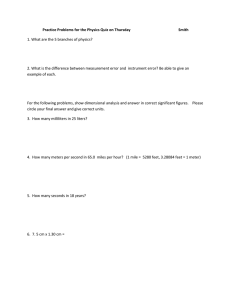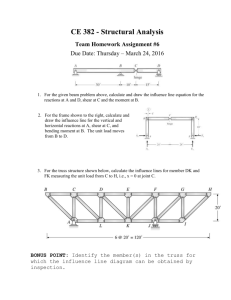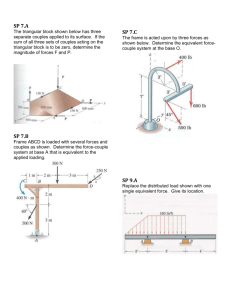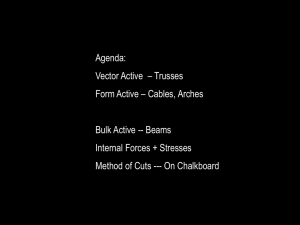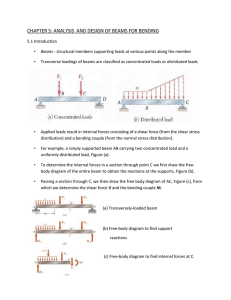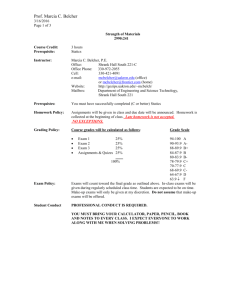Forces in Beams: Shear & Bending Moment Diagrams
advertisement
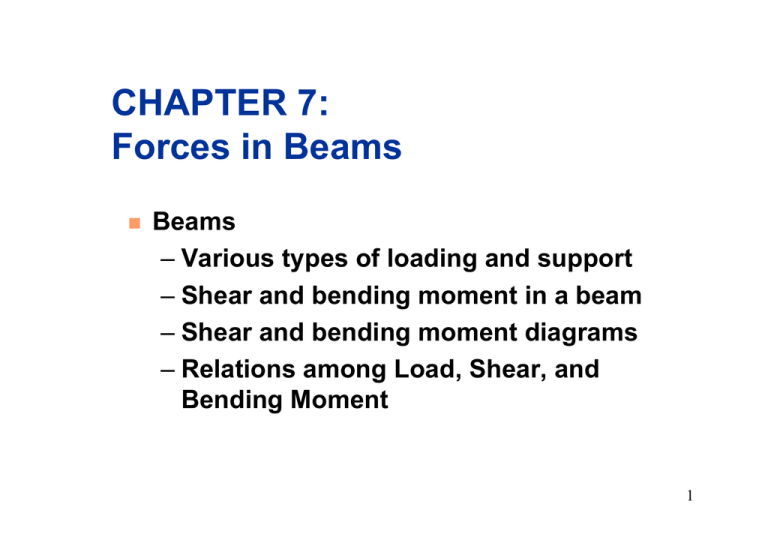
CHAPTER 7: Forces in Beams Beams – Various types of loading and support – Shear and bending moment in a beam – Shear and bending moment diagrams – Relations among Load, Shear, and Bending Moment 1 7.1 Internal Forces in Members F B B F F B C B F C A A C F F C A F C F F C F A F Tension F Compression 2 D E F C B W A G D J T N D C Cy B Ax Cx FEB J V T N V M J C Cy B M Cx FEB Ax A Ay A Ay 3 B B M D N D P P A V C P M N A V P D C 4 Example 7.1 In the frame shown, determine the internal forces (a) in member ACF at point J and in member BCD at point K. (b) determine the equation of internal forces of member ACD and draw its diagram. This frame has been previously considered in sample 3.6 m 1000 N A 1.2 m 2400 N J 2.7 m B K 2.7 m 1.5 m C E 4.8 m D F Guide : Assuming that Frame can be treated as a rigid body. The reactions and the forces acting on each member of the frame are determined. Member ACF is cut at point J and member BCD is cut at point K, the internal forces are represented by an equivalent force-couple system and can be determined by considering the equilibrium of either part. 5 (a) • Define the state of the problem 3.6 m 1200 N A 1.2 m 2400 N J 2.7 m B K 2.7 m 1.5 m C E D F 4.8 m Assuming that Frame can be treated as a rigid body. Member ACF is cut at point J and member BCD is cut at point K, the internal forces are represented by an equivalent force-couple system. 6 • Construct the physical model, construct mathematical model and 3.6 m solve equations 1200 N 1.2 m A 2400 N 2.7 m B C 2.7 m Ex = 1200 N 450 N 1200 N 2.7 m Ex = 1200 N E Ey = 750 N A 2.7 m B 1.5 m 4.8 m D F A 2400 N 2400 N 1200 N E 450 N F = 3150 N 2.4 m 1.2 m 2400 N 2400 N D B C 2400 N 1200 N 3600 N 2.7 m B 2400 N 3600 N C 2.7 m F 4.8 m 750 N 2400 N 3150 N 7 • The diagram of internal forces of member BCD Nx1 = +2400 N Nx2 = 0 Vx1= -1200 N Vx2= 2400 N Mx1 = -1200x1 N•m Mx2 = -2400x2 N•m 2.4 m 1.2 m 2400 N 2400 N B x1 D C 2400 N 1200 N 3600 N x2 N (N) +2400 x 2400 V (N) A = +2880 x A = -2880 -1200 M (N•m) x -1800 -2880 8 BEAMS 7.2 Various Types of Loading and Support P1 A B P2 C D Concentrated loads w A B Distributed load C 9 L L1 Simply supported beam L2 Continuous beam L L Overhanging beam Beam fixed at one end and simply supported at the other end L L Cantilever beam Fixed beam Hinge 10 7.3 Shear and Bending Moment in a Beam Internal Loadings at a Specified Point • Sign Convention M M N V N V N N V M M V Positive Sign Convention 11 Shear and Moment Functions P x1 x2 A B L/2 P/2 x1 L/2 P/2 Mx1 A P/2 + + + ΣMx1 = 0: Mx1 = (P/2)x1 Vx1 Mx2 x2 ΣFy = 0: Vx2 = -P/2 + ΣMx2 = 0: Mx2 = (P/2)x2 V ΣFy = 0: Vx1 = P/2 B Vx2 P/2 P/2 x M PL/4 -P/2 x 12 P w A B x1 D C x2 x3 OR P w A x1 B x2 C D x3 13 7.4 Relations Among Load, Shear, and Bending F1 F2 F3 Moment w = w(x) A . . . . M1 B C M2 x w(x)∆x D ∆x w + w(x) ΣFy = 0: V − w( x) ∆x − (V + ∆V ) = 0 ε∆x V M O ∆x . M + ∆M V + ∆V ∆V = − w( x)∆x + ΣMO = 0: − V∆x − M + w( x) ∆xε (∆x) + ( M + ∆M ) = 0 ∆M = V∆x − w( x)ε (∆x) 2 14 ∆V = − w( x)∆x ∆M = V∆x − w( x)ε ( ∆x) 2 Dividing by ∆x and taking the limit as ∆x 0, these equation become dV = − w(x) dx ----------(7-1) Slope of Shear Diagram = -Intensity of Distributed Load dM =V dx ----------(7-2) Slope of Moment Diagram = Shear Equations (7-1) and (7-2) can be “integrated” from one point to another between concentrated forces or couples, in which case ∆V = − ∫ w( x)dx Change in Shear = -Area under Distributed Loading Diagram ----------(7-3) and ∆M = ∫ V ( x)dx Change in Moment = Area under Shear Diagram ----------(7-4) 15 F V V M M + ∆M ∆x M V + ∆V + ΣFy = 0: M´ . O ∆x M + ∆M V + ∆V ∆V = − F Thus, when F acts downward on the beam, ∆V is negative so that the shear diagram shows a “jump” downward. Likewise, if F acts upward, the jump (∆V) is upward. + ΣMO = 0: ∆M = M ' In this case, if an external couple moment M´ is applied clockwise, ∆M is positive, so that the moment diagram jumps upward, and when M acts counterclockwise, the jump (∆M) must be downward. 16 P ML 0 MR 0 VL M´ w0 ML VL ML w1 0 MR ML 0 -wo MR VR VL w1 ML w2 M R VL VR VR VL 0 MR Slope = VR VL VR w2 MR MR ML VR VL ML VR Slope = VL Slope = VR Slope = VL ML Slope = -w1 Slope = VR Slope = -w2 VR VL MR Slope = VL ML MR Slope = VR Slope = w1 Slope = -w2 VR Slope = VL ML MR 17 Example 7.2 From the structure show. Draw the shear and bending moment diagram for the beam and loading. (a) use the equations each section. (b) use the relations among load, shear, and bending moment. 20 kN 40 kN B A 2.5 m 3 m C D 2 m 18 (a) use the equations each section. 20 kN x1 2.5 m By = 20 kN A x2 B A 3 m D C 2 m 40( 2) + 20(7.5) = 46 kN 5 x1 Mx1 + Dy = 20 + 40 - 46 = 14 kN ΣFy = 0: Vx1 = -20 + ΣMx1 = 0: Mx1 = -20x1 20 kN Vx1 B A 2.5 m 46 kN + 40 kN x3 ΣFy = 0: Vx3 = -14 + ΣMx3 = 0: Mx3 = 14x3 x2 Mx2 Vx2 Mx3 + ΣFy = 0: Vx2 = 46-20 = 26 + ΣMx2 = 0: Mx2 = 46x2 - 20(2.5 + x2) Mx2 = 26x2 - 50 x3 D Vx3 14 kN 19 (a) use the equations each section. 20 kN x1 A x2 B 2.5 m 3 m 40 kN x3 C D 2 m 46 kN Vx1 = -20 V (kN) Vx2 = 26 14 kN Vx3 = -14 Mx1 = -20x1 Mx2 = 26x2 - 50 Mx3 = 14x3 26 x -14 -20 28 V (kN•m) x -50 20 (b) use the relations among load, shear, and bending moment. 20 kN 40 kN B A 2.5 m 3 m C D 2 m 46 kN V (kN) 26 14 kN 26 A = +78 A = -28 A = -50 -20 -20 M (kN•m) -14 x -14 28 x -50 21 Example 7.3 Draw the shear and bending moment diagram for the the mechanical link AB. The distributed load of 40 N/mm extends over 12 mm of the beam, from A to C, and 400 N load is applied at E. 40 N/mm B A C 12 mm D 6 mm 4 mm 10 mm 400 N 32 mm 22 480 N B A Ay = 480 + 400 - 365 = 515 kN D C 6 mm 4 mm 10 mm 400 N 32 mm 12 mm 480 N 1600 N•mm 515 N V (N) 400 N 365 N 515 35 A = +3300 x A = 210 V (N•mm) 480(6) + 400(22) 32 = 365 kN By = 3300 3510 A = 5110 -365 5110 -365 x 23 Example 7.4 Draw the shear and moment diagrams for the beam shown in the figure. 20 kN/m 9m 24 x 3 1 x ( )( x )(20 ) 2 9 (1/2)(9)(20) = 90 kN 20 kN/m (2/3)9 = 6 m x (20 ) 9 M 90-60 = 30 kN 90(6)/9 = 60 kN 9m V (kN) 30 kN V=0 x 30 + V=0 + x x = 5.20 m - ΣFy = 0: 1 x 30 − ( )( x)(20 ) = 0 2 9 x = 5.20 m 60 M (kN•m) 104 + ΣMx = 0: 1 5. 2 5. 2 M + [( )(5.2)(20 )]( ) − 30(5.2) = 0 2 9 3 + x M = 104 kN•m 25 Example 7.5 Draw the shear and moment diagrams for the beam shown in the figure. 3 kN 5 kN•m A B C 3m D 1.5 m 1.5 m 26 3 kN 5 kN•m A B C 0.67 kN 3m V (N) 0.67 D 1.5 m 1.5 m + 2.33 kN x (m) -2.33 2.01 M (kN•m) + 3.52 - + x (m) -1.49 27 Example 7.6 Draw the shear and moment diagrams for the compound beam shown in the figure. Assume the supports at A is fix C is roller and B is pin connections. 8 kN A 12 m 12 m hinge B 30 kN•m C 15 m 28 8 kN A 12 m 12 m hinge B 30 kN•m C 15 m 30 kN•m 0 = Bx By = 2 kN Cy = 2 kN MA = 48 kN•m 8 kN By = 2 kN Bx = 0 Ax = 0 Ay = 6 kN 29 8 kN 30 kN•m 48 kN•m A 6 kN 12 m 12 m 6 B C 15 m 2 kN 6 V (kN) x (m) -2 -2 24 8m M (kN•m) x (m) -30 -48 30 Example 7.7 Draw the shear and moment diagrams for the compound beam shown in the figure. Assume the supports at A and C are rollers and B and D are pin connections. 60 kN • m 5 kN 2 kN/m 3 kN/m Hinge A C B 10 m 6m 4m D 6m 6m 31 60 kN • m 5 kN 2 kN/m 3 kN/m Hinge A C B 10 m 6m 4m D 6m 6m 20 kN 60 kN • m By = 16 kN Bx = 0 kN 4m Ay = 4 kN 5 kN 9 kN 4m 9 kN Dx = 0 kN 0 = Bx By = 16 kN Cy = 45 kN Dy = -6 kN 32 60 kN • m 5 kN 2 kN/m 3 kN/m Hinge A 4 kN B 10 m 4m 6m C 6m D 6m 6 kN 45 kN 24 V (kN) 4 6 x (m) 2m 64 -16 -21 -21 60 M (kN • m) x (m) -96 -180 33

